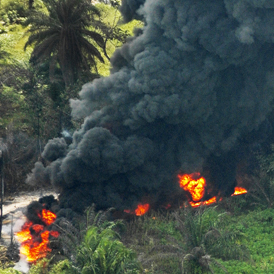Nigeria oil clean-up could be ‘world’s biggest’
The restoration of Nigeria’s Ogoniland region, which has been devastated by decades of oils spills, will require the world’s biggest clean-up according to a UN report.
The long awaited study from the United Nations Environment Programme (UNEP) has found restoration of Ogoniland could take up to 30 years and will require an initial $1bn.
The report says it will be the world’s most “wide-ranging and long-term oil clean-up” ever.
In one community, at Nisisioken Ogale, families are drinking water from wells contaminated with benzene, a known carcinogen, at levels over 900 times above World Health Organisation guidelines.
The site is close to a Nigerian National Petroleum Company pipeline.
The study was partly funded by Shell which has been operating in Nigeria for decades.
Achim Steiner, UN Under-Secretary General and UNEP Executive Director, said the report provided the scientific basis on which a long overdue and concerted environmental restoration of Ogoniland can begin.
“The oil industry has been a key sector of the Nigerian economy for over 50 years, but many Nigerians have paid a high price, as this assessment underlines,” he said.
A spokesman for Shell Petroleum Development Company of Nigeria (SPDC) said:

“SPDC welcomes the submission of the UNEP report to the Nigerian government. We will study the contents carefully and will comment further once we have done so.”
Shell admits responsibility for two spills
On Wednesday Shell admitted responsibility for two large spills in 2008 and 2009 affecting the Ogoniland region.
Shell told Channel 4 News it estimated 415,000 barrels had been spilt in Nigeria during the last decade.
Shell accepts responsibility for 25 per cent of those leaks but blames theft and sabotage for the others.
In an open letter, written before the UN report was released, the Managing Director of the Shell Petroleum Development Company of Nigeria Mutiu Sunmonu said:
“Concerted effort is needed on the part of the Nigerian government (which itself owns a majority interest in the assets operated by SPDC under a joint operating agreement with the Nigerian state oil company, NNPC), working with oil companies and others, to end the blight of illegal refining and oil theft in the Niger Delta, both of which perpetuate poverty.
“This is the major cause of the environmental damage which media reports have so graphically illustrated.”